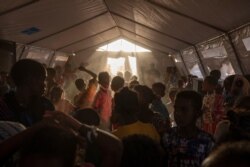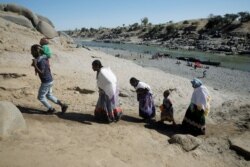The first shipment of international aid since fighting began arrived in Ethiopia's northern Tigray region Saturday to help people affected by violence there.
A convoy carrying medicine and relief supplies from the International Committee of the Red Cross and the Ethiopian Red Cross Society reached the province one day after the United Nations voiced alarm over the forced return of Eritrean refugees to camps they had fled.
The convoy was planned with the help of Ethiopian government authorities.
ICRC Regional Director for Africa Patrick Youssef said the aid was vital, particularly for hospitals and vulnerable segments of the population.
“Doctors and nurses have been ... weeks without new supplies, running water, and electricity,” Youssef said. “This medical shipment will inject new stocks, help patients, and reduce those impossible life-or-death triage decisions.”
The Ethiopian government said in a statement Friday it was sending back Eritrean refugees who had fled from Tigray to Addis Ababa in recent weeks. The U.N. refugee agency said it had received reports of several hundred refugees being transported to Tigray on buses.
The government said it was safe for the refugees to return “to their respective camps” after the army defeated forces loyal to the region’s former ruling Tigray People’s Liberation Front (TPLF).
The United Nations High Commissioner for Refugees Filippo Grandi said Friday he was alarmed over the refugees’ return to the Tigray region, where the U.N. aid agencies and others have been denied access since the fighting began on Nov 4. About 96,000 Eritrean refugees live in camps in the region.
The aid agencies said they believed food was in short supply at the camps and have also expressed concern about reports of continued violence in some areas.
“The government of Ethiopia has said it will guarantee humanitarian access to the Tigray region for the U.N. and its partners. While the signed agreement is one first step, it needs to be implemented in a way that ensures safe and unhindered access for humanitarian workers in accordance with the principles of neutrality and impartiality,” Grandi said in statement. “Such access is urgently needed so we can provide desperately needed assistance to refugees and other vulnerable populations.”
TPLF leaders said they are continuing to fight back against Ethiopian forces. But claims by both sides are difficult to confirm because most communications to Tigray are down and the government maintains tight control over access to the area.
Even before the fighting in Tigray, some 600,000 people in the region were already dependent on food aid.
Thousands of people are believed to have been killed in the conflict, which has displaced more than one million people, including 45,000 refugees who fled to neighboring Sudan.
Ethiopian Prime Minister Abiy Ahmed first claimed victory last week over the TPLF after federal forces captured Tigray’s capital of Mekelle.
Abiy’s government regards the Tigray regional government as illegitimate. The TPLF went ahead with regional elections in September in defiance of Abiy’s decision to postpone the vote.
The Tigray regional government had dominated Ethiopia’s ruling coalition for more than a quarter-century until Abiy took power in 2018.







